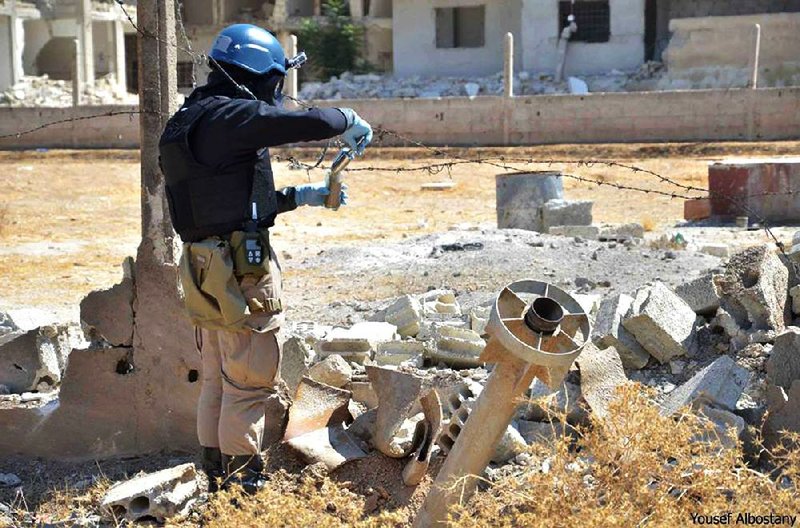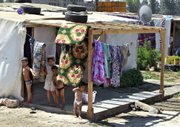WASHINGTON - The United States and the U.K. are prepared to take military action against Syria without authorization from the United Nations Security Council, the nations said Wednesday.
After Russia objected to a U.N. resolution offered by the U.K. authorizing action to protect civilians, a State Department spokesman said the U.S. will take “appropriate” action without the international body’s approval.
“We do not believe the Syrian regime should be able to hide behind the fact that the Russians continue to block action” by the Security Council, Marie Harf said.
“By far the best thing would be if the United Nations could be united, unlikely as that seems in the face of the vetoes from Russia and China that we’ve had in the past,” U.K. Foreign Secretary William Hague said. “But we have to try to do that. We’re clear that if there isn’t agreement at the United Nations, then we and other nations still have a responsibility on chemical weapons.”
The United States has “concluded” that the Syrian government carried out the Aug. 21 chemical-weapons attack in the Ghouta suburb of Damascus, President Barack Obama said Wednesday. International aid group Doctors Without Borders has said the attack killed at least 355 Syrians and sickened 3,600 more.
Laying out a legal justification for a U.S. response, Obama said Syria is violating the Geneva Protocols, an agreement signed in 1925 in the wake of World War I to ban the use of chemical gases. The White House also has cited the Chemical Weapons Convention, a 1992 agreement that builds on the Geneva Protocols by prohibiting the development and stockpiling of chemical weapons.
But Lakhdar Brahimi, the U.N. and Arab League special envoy to Syria, said he is waiting to see what evidence is produced against Syrian President Bashar Assad’s regime and that any action must have U.N. sanction.
“International law is clear,” Brahimi said. “It says military action must be taken after a decision by the Security Council.”
U.S. lawmakers stepped up their call Wednesday for Obama to consult with Congress before ordering a military strike on Syria, with 98 Republicans and 18 Democrats in the House signing a letter pressing the president to seek a vote before taking action.
Though Congress is not expected to reconvene until Sept. 9, the letter said members were willing to return early to take up the issue.
House Speaker John Boehner also sent Obama a letter, which stopped short of demanding a vote but called on the president to provide a legal justification for force. He also asked Obama to answer more than a dozen questions about military plans in Syria.
The administration was planning a teleconference briefing today on Syria for leaders of the House and Senate and national security committees in both parties, U.S. officials and congressional aides said.
British Prime Minister David Cameron also was encountering resistance. Opposition leader Ed Miliband offered tentative support for possible attacks after meeting Cameron on Tuesday while saying his Labor Party won’t vote for military action over Syria without U.N. involvement.
As in the U.S., polls in Britain show a majority of the public opposes further involvement in the Syrian conflict.
Despite the resistance, the U.S. is concerned that letting the Syrian government go unpunished would send a signal to other countries that have large inventories of chemical weapons, including North Korea, and increase the likelihood that Assad’s government will attack civilians again with such weapons, the official said.
The Obama administration is consulting with NATO allies including the U.K., France, Germany and Turkey, as well as Arab nations such as Saudi Arabia, Jordan, Qatar and the United Arab Emirates, to determine which countries would participate in a military operation, an official said.
To bolster domestic and foreign support for military action, the Obama administration is working to declassify intelligence to provide evidence that Assad’s forces are responsible for the chemical attack, officials said. The CIA, the Pentagon and the Office of the Director of National Intelligence all declined to comment on the intelligence.
Obama and allied leaders also are working to define the objectives of a military strike, a U.S. official said. Any use of force won’t be limited to a one-day operation, the official said.
Among the options being explored are how to deter and degrade Syria’s chemical-weapons capability and defeat the Assad government’s defense capabilities, a U.S. official said.
Separate discussions are being held on whether, when and how to accelerate and expand military and intelligence assistance to mainstream Syrian rebels groups to prevent extremist groups affiliated with al-Qaida from reaping the benefits of Western attacks on the Assad regime, said another U.S. official, who requested anonymity.
DEBATE ON A DATE
While officials have said the U.S. has warships and submarines carrying Tomahawk cruise missiles ready for action in the eastern Mediterranean Sea, any military move may still be days away, in part because a team of U.N. weapons inspectors needs more time to complete its report.
Cameron on Wednesday acceded to Miliband’s demand that the inspectors be allowed to complete their report before Parliament begins a debate on whether to authorize military action.
U.N. Secretary-General Ban Ki-Moon said the inspectors visited the site of the purported attacks in the Ghouta area Wednesday and that no action should be taken until the inspectors finish their work.
“Let them conclude … their work for four days and then we will have to analyze scientifically” their findings and send a report to the Security Council, he said. The U.N. said the analysis would be done “as quickly as possible.”
Ban also pleaded for more time to give diplomacy another chance to end the more than two-year conflict that has killed more than 100,000people.
Syria’s ambassador to the U.N., Bashar Jaafari, added a new level of complexity to the issue Wednesday, announcing that he had submitted evidence of three previously unreported instances of chemical-weapons use in Syria, which he asserted had been carried out by the Syrian opposition. He said the Syrian government had requested that the U.N. investigators expand their inquiry to include those events.
The new instances occurred Aug. 22, 24 and 25, and also were in the Damascus suburbs, Jaafari said, and Syrian soldiers were the targets. The ambassador did not explain why he is only now raising the allegations.
Jaafari repeated the Syrian government’s denials that it had ever used chemical weapons in the conflict and said the accusations were a conspiracy by Western nations.
“We are not warmongers,” he said. “We are a peaceful nation seeking stability. The Syria government is totally innocent of these accusations.”
Meanwhile, Russian officials accused Western nations of short-circuiting the work of the inspectors in their eagerness to launch an attack.
“U.N. experts started working in Syria. Several NATO countries said the experts’ conclusions were unnecessary and expressed readiness to launch a military operation against the Syrian military,” parliamentary speaker Sergei Naryshkin said. “These are very dangerous statements. Currently no one knows who has used chemical weapons.”
A Western military operation against Syria will lead to further bloodshed and will not resolve the civil war there, he said. It will, however, “cause significant damage to the U.N., the world community and international law,” he added.
Russia’s Emergency Services Ministry said Wednesday that it was evacuating more Russians and citizens from other former Soviet republics from Syria, where Moscow maintains a naval base and where thousands of its citizens live.
Russia began evacuating its citizens from Syria in January. Since then, more than 700 have left, most of them women and children. They are a fraction of the more than 30,000 Russians who are believed to live in Syria, but in the wake of last week’s attacks, the pace of the evacuations appears to be increasing.
FEAR INCREASING
Signs of growing fears were seen across the region Wednesday.
Residents of Damascus shuttered themselves inside their homes. Some ventured out to join breadlines, which stretched even longer than usual as people stocked up.
The army’s headquarters on Umayyad Square was at least partially evacuated, as were intelligence buildings, according to rebels and activists, who cited unusual movement and “intelligence” suggesting senior officials had been told to head to alternative gathering points.
A suspected chemical-weapons facility in the northern Barzeh district also was evacuated, according to the opposition Damascus Media Center.
At least 6,000 Syrians crossed into Lebanon in a 24-hour period through the main Masnaa crossing, including an estimated 4,000 on Wednesday, according to Lebanese security officials. The normal daily influx is 500 to 1,000 refugees, said the officials, who spoke on condition of anonymity in line with regulations.
About 2 million Syrians are estimated to have fled the country since the crisis began in March 2011, according to the U.N., and millions more are displaced inside Syria.
The worries were also evident in Israel, where large crowds lined up at gas-mask distribution centers.
The Israeli military is taking defensive measures to safeguard the country, preparing for the possibility that Israel will become the target of retaliation for a Western attack on Syria, officials said Wednesday. The government authorized the call-up of a limited number of reservists with specialized roles in defense of the home front and in the operation of Israel’s Iron Dome rocket interceptor and other air-defense systems, according to a government official in Jerusalem.
Those include the Patriot and the Arrow systems, meant to intercept midrange and longer-range missiles.
Prime Minister Benjamin Netanyahu urged calm, saying after security consultations at the Defense Ministry headquarters in Tel Aviv that “there is no reason to change daily routines. At the same time, we are prepared for any scenario.”
But while some Iranian lawmakers implied that a military intervention in Syria would result in counterattacks on Israel, the Islamic republic’s top leaders said Wednesday that their priority is averting a larger war in the Middle East.
Iran’s supreme leader, Ayatollah Ali Khamenei, told the country’s new Cabinet that any U.S. involvement in the Syrian crisis would constitute a “disaster for the region.”
“Starting this fire will be like lighting a spark in a large gunpowder keg, with unclear and unspecified outcomes and consequences,” Khamenei said. He warned that “the Americans will suffer damages similar to when they interfered in Iraq and Afghanistan.”
Iran’s new president, Hassan Rouhani, reiterated those concerns. “The people of the world and especially the Middle East cannot tolerate another war, and any new adventure in this region will deeply affect world peace and stability and only lead to the expansion of radicalism and terrorism,” Rouhani said.
Jordan, meanwhile, said itwill not be used as a launching pad for attacks on Syria and favors a diplomatic solution. The remarks underlined the U.S. ally’s efforts to avoid further friction with its larger neighbor for fear that Assad or his Iranian backers could retaliate.
Information for this article was contributed by staff members of Bloomberg News, The New York Times, The Washington Post and The Associated Press.
Front Section, Pages 1 on 08/29/2013



